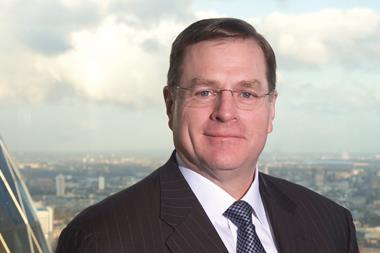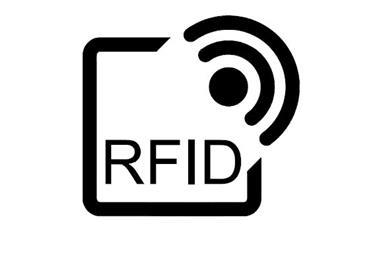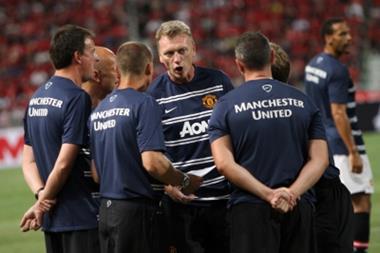Understanding the value of data helps Manchester United deliver success in all aspects of their operations
Aon’s partnership with Manchester United did not come around by serendipitous accident.
Instead it is the culmination of years of working together, long before Aon’s name started appearing on any jointly branded materials.
Before the two joined forces as partners in 2010, Manchester United were Aon clients. Aon might be American in origin but the company has long since operated a large office in central Manchester with hundreds of personnel based there and it has been working with the club on risk, insurance and human capital issues for many years.
Developing trust and understanding through Aon’s every day dealings with Manchester United has been a major advantage for both sides as the association between the two started to develop further, according to Aon Risk Solutions UK CEO Jim Herbert.
“Our business relationship with Manchester United predates the football sponsorship which, for me, is a major benefit here as we have not just suddenly been appointed – we were there already.” he says.
Herbert and his Aon Risk Solutions group are deeply involved with handling and advising on many of the risk-related processes at Manchester United.
“We spend a lot of time on business interruption and business continuity planning,” Herbert says.
One of the BCP focal points is travel, making sure that the team and their supporters can get to matches safely, wherever they are being held.
“We use World Aware, which is our travel secure process,” says Herbert. “It is both an IT system and a consulting proposition. Manchester United have a lot of capability of their own around safe travel but we still consult with them based on our data and our knowledge of local markets.”
The word data crops up frequently when Aon executives speak about their client work. For them it runs through almost everything the business touches.
There are many reasons why data are so important, as Herbert explains, which is why Aon is working on a number of developments to enhance further how it is utilised.
“If you look at any retail organisation right now, probably the biggest asset they have is data – the knowledge of their client base,” Herbert says.
“So it is essential for us to be able to develop data and deliver knowledge to our clients whether it is to Manchester United or to anyone else, about risk, the insurance market, what they might anticipate as being outcomes from the decisions they are taking.
“We have gone from having enormous amounts of data that we have simply failed to capture through to capturing an enormous amount of data that we didn’t really know necessarily what its ultimate use would be. We then moved to advising people on what their current state is compared with their peer group. Now everything is moving towards predictive analytics around what will happen if you take these courses of action.”
Manchester United understand well the value of such data, particularly in terms of how it enables them to get the best from the team on the pitch.
“We have a huge amount of help going into analytics, making sure that we are using the best in class data procedures,” says Manchester United Group Managing Director Richard Arnold.
“When 11 players get on to the pitch it isn’t an accident how they play and the amount of work that goes in is important.
“For two hours a week we are on TV in a billion homes around the world. The results from those two hours are generated in all the remaining hours that people spend here [at the Aon Training Complex].
“And this is where our results are generated – not on the pitch. When we turn up on the pitch we have to deliver the work that we have been practising and developing. And that is where the partnership we have with Aon and the proof points that we have about the help they are providing to us as a client demonstrates the work that they can do for other businesses around the world.”
Winning matches is the ultimate measurement of performance and that aspect of the club is one which can be seen and is assessed not only by Aon and Manchester United but by billions of people around the world.
“The fortunate/unfortunate part of our business,” says Arnold, “is our performance is easily measured. The results are twice weekly, millions of people watch, hundreds of millions of people really care about every week’s performance and when you look at businesses around the world that is a level of scrutiny that not many have to stand up to.”
The whistle at the end of games is the focal endpoint for everything goes on behind the scenes.
“Two hours a week on the pitch is the tip of the iceberg compared to the work that goes in to making sure we succeed,” says Arnold.
Week by week, day by day, hour by hour, preparation is relentless with ongoing analysis of each individual player and a focus on keeping them fit and healthy.
“That is the purest form of the preparation work that we have to do to empower results and that we have a lot of help from Aon in analysing how that works,” says Arnold.
With a global client base Aon has developed a wealth of data which, when stripped of certain elements to ensure anonymity allows the firm to develop and share ideas and understanding about business operations and key trends.
Big data is an often misused phrase but in Aon’s case fails to do justice to its enormous repository of information.
Herbert says being able to work with such material gives Aon and its clients a crucial business advantage when dealing not only with Manchester United .
“Any data we collect on an organisation is always anonymous but we can still aggregate that data to create something that is genuinely of interest to people,” Herbert says. “Now clearly people then have a choice as to where they want their risk profile to sit. So you can understand how the data describes the future outcome of current positions and put yourself on the spectrum of probability based on your risk appetite. So those capabilities are enormous and yet they are informed on a two-way basis. I think that will be the way our marketplace goes over time.
Aon Global Risk Consulting Chairman and CEO of GRIP and Global GRIP Solutions Stephen Cross is very much at the heart of the data process both in terms of working with Manchester United and the firm’s other clients.
To him, data lies at the heart of being able to make considered judgments on both the perils and opportunities which lie ahead for businesses.
Looking back is an essential part of seeing what lies on the road ahead.
“We believe that most risks have happened on the curve before,” Cross says. “So Manchester United takes the risk for their club and we see what goes on worldwide in 120 or so countries around the world.
“We have the data and we also have around $85 trillion of insured limits in our Global Risks Insight Platform in Dublin, which is hugely predictive of future outcomes, as to what and how things can occur.
“We are very much into predictive analytics and that is where we help Manchester United and our other clients around the world to actually foresee where those risks are going.
“To me the most fascinating area is how this changes as the world evolves. We are now living in a very hyper-connected world that did not exist five or 10 years ago so what are the correlations between the different risks that occur? At Aon we are in a fabulous place to see that because of our depth of data. We report all of that detail in our system and we turn out our statistical analysis of what is likely to happen.
“That is where we really help all of our clients, not just Manchester United, around the world, predicting risk and modelling risk to that effect. In a way I have the easy job because whether it is health or retirement or risk or capital, it is all data – everyone has data, it then comes down to how you capture and then refine that data so that it becomes useful for you.”




















No comments yet